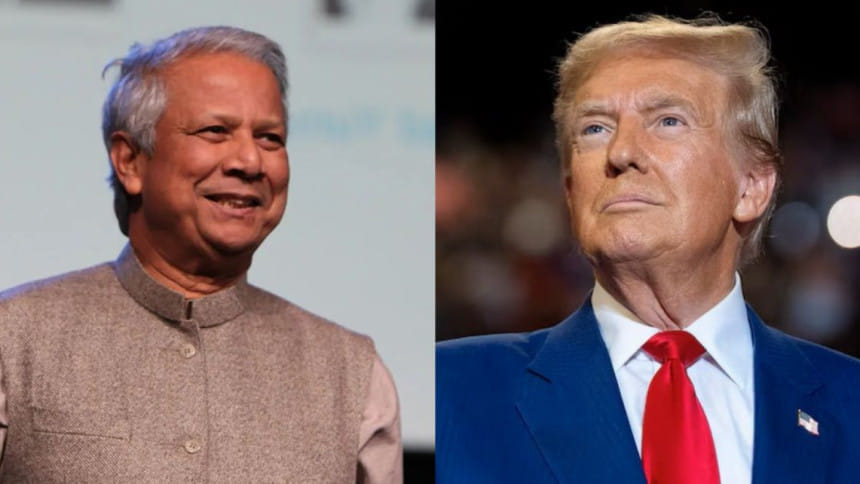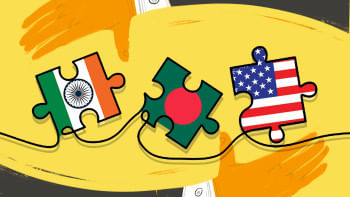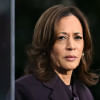Will Trump's return change Bangladesh-US ties?

In the aftermath of Donald Trump's resounding victory in the US presidential election 2024, Michael Kugelman, the director of South Asia Institute in the Wilson Center, speaks to Ramisa Rob of The Daily Star, about the implications for Bangladesh at large.
What does Trump's victory, and the change in leadership in the US, mean for Bangladesh—in the short-term and long-term?
There won't be any notable implications in the immediate term, for example in the first weeks and months when Donald Trump takes office in January. But I do recognise that in itself is an implication and change for Bangladesh because it's experiencing significant challenges especially in the economic front to reform the country, and it won't really have the US to check in on them.
There are several things we have to remember. One, the relationship between Bangladesh and the US, during the first Trump administration, saw many strategic partnerships. It was during that period that the Trump administration launched the Indo-Pacific policy, and considered Bangladesh to be a big part of that. Trade between the US and Bangladesh also went up as well. Now, the question is: what do those experiences tell us about what could happen now over the next four years?
One has to acknowledge obviously that a lot has changed in Bangladesh—there's now a new leader, Dr Yunus, who was quite critical of Donald Trump previously. But this time, he's leading the interim government and his reaction was obviously very different: a cordial letter was issued to congratulate Trump. I also think the question is how Trump would look at the state of the relationship and whether he would want to refashion the current relationship, which I think he will as I don't think he will prioritise the US robustly embracing development assistance, and so on.
How exactly would he refashion the development assistance, and how much change could we be looking at?
The current messaging that the US wants to help Bangladesh in strengthening the economy and engaging in reforms and with that new agreements, including a USAID agreement that commits new funding to Bangladesh, would probably change. The way Donald Trump looks at foreign policy is very transactional and pragmatic and he also takes an approach of burden-sharing with allies and partners. So I don't think Trump would be interested in continuing the current nature of the relationship. But now, if we are to contemplate the possibility that the Trump administration would want to pull back on the commitments that have been made so far by the current Biden administration—I don't think we should overstate the deleterious impact that could have on Bangladesh just because Bangladesh, especially with a Yunus-led government, is a country that has a lot of friends, partners and multilateral donors around the world.
Just days before the election, Trump had posted a factless, incendiary tweet about Bangladesh. Can we anticipate the rhetoric will continue?
My view is that it doesn't necessarily reflect his actual positions but rather the US electoral politics at play. There have been several prominent Hindu American activists who have said publicly that Trump's statements were a product of their advocacy, and these activists are essentially Modi supporters as well. The comments that Trump made were not only directly at Bangladesh—he did mention he looks forward to working with his good friend, Modi. I think this does get to an important issue. Clearly, the government of Bangladesh understands that this was an electoral strategy, but I suspect it did not go down well in Dhaka, so the US-Bangladesh relationship will take off to a tricky start when Trump takes office because these comments must have left a bitter taste in the mouth of the Bangladesh government. From a public diplomacy standpoint, there has been a pushback against this disinformation about Bangladesh since August, and Trump's comments must have negatively affected that. But it's something that can be worked through. It's clear to me that Dr Yunus wants this relationship to work and the onus will be on him and the interim government to get through to the Trump administration that it wants this to work. I don't expect to see initiations from the Trump administration towards Bangladesh.
What is the current relationship and how will that tangibly change, especially in the context of delicate state of Bangladesh-India relations as well?
It is very clear that the politics of Dr Yunus don't align with Donald Trump. For his work as an economist and pioneer of the microfinance industry, many Western liberals and members of the Democratic Party respect Dr Yunus. We know when Yunus took office, the Biden administration responded very positively, which was significant given that we had seen tensions creep into the US-Bangladesh relationship in the last few years of the Sheikh Hasina government. When the Chief Advisor was in Washington for the UNGA, he was hosted by the Clinton Foundation. So obviously, those things are going to be different now because Donald Trump embodies a very different type of worldview. But the personality differences between the leaders in due course can be overcome when you look at the broader interests. Trump would recognise that there is a significant trade partnership between Bangladesh and the US. And there should be recognition, from the perspective of the Trump administration, based on geopolitical considerations that it's important for the US to not back away too much from Bangladesh which would drive the nation even closer to China.
Getting to the India factor, it's very clear to me that Donald Trump and Narendra Modi have a good rapport, and their ideological views are in many cases convergent. But I just don't think that would affect Bangladesh as the US and Bangladesh have a trade partnership—the US being a top destination for exports—and that would not concern India. And regarding the great power competition, Trump's ideologies would very much align with what India would like to see, which is that the Bangladesh government does not get closer to China. On the other hand, the fact that you're not going to have a US President who would go out of his way to strengthen the relationship with the current interim government, and show commitment to working with it. That kind of messaging would have been heard with the Harris administration but it won't come from the Trump administration, and in the context of current tense Bangladesh-India relations, it would be more reassuring for India.
Given Trump's hardline position on China, how would that affect the relationship between Bangladesh and the US?
If Trump takes a hardline on US-China competition—he likely will but you never know with him—and he may try to push Dhaka to sort of move away from the Indo-Pacific Outlook—a document that was passed by the previous government in Bangladesh to balance the relationship between the US and China. He could be more direct that Dhaka has to work more with Washington, which could cause tensions. But as you know, Trump is a maverick. While you can make inferences based on what he's done in the past, we can't rule out the possibility that he could decide after taking office, to reach some sort of understanding with President Xi Jinping. He just likes to do things like that. Let's not forget that during his first year in office, he did suggest that he saw China as a friend. So if we were to have this sort of "black swan" development and Trump decided that he wants to tone down the US-China competition, it would be very helpful for US-Bangladesh relations and Bangladesh's geopolitical interests on the whole.
Trump's campaign presented protectionist economic policies, so would that hamper the trade relationship with Bangladesh?
If you look at the data compared to 2022 and 2023, there has been a notable reduction in trade volume. Though not significant, there also has been a reduction in the US foreign direct investment (FDI) to Bangladesh. It is honestly because of the economic slowdown we're seeing in Bangladesh, so to speak. So I think if Trump were to come in and start making recommendations on tough tariff policies, that would certainly impact US-Bangladesh commercial relations. But it's important to know there are other ways to pursue commercial relations, through the development-finance corporation (DFC). If Bangladesh is able to strengthen its labour rights, then DFC theoretically would be able to provide support to Bangladesh's infrastructure projects and so on. Bangladesh is not authorised yet on DFC because of labour rights concerns that US officials have had, but if that were to change, it would be good for Bangladesh. And it could change, as I don't know if a Trump administration would be as strict regarding labour concerns compared to a Democratic administration.
Regarding the Rohingya issue, how would Trump's victory affect the mounting crisis in Bangladesh?
Given the situation in Myanmar, the Biden administration has been firmly behind Bangladesh, in terms of committing and maintaining assistance, mainly for USAID. By contrast, the Trump administration probably won't be as generous to disperse resources. But the security implications of a worsening war in Myanmar for Bangladesh could get the attention of the Trump administration, if the government in Dhaka presented the Rohingya issue not just as a humanitarian issue, but from a broader stability perspective.
We have seen Dr Yunus try to get the world's attention on the Rohingya issue. He has raised the issue of relocation to other countries, more so than repatriation because I don't think the Yunus-interim would repatriate the Rohingya to Myanmar given the lack of their safety over there. Regarding this, the Trump administration would not be a supporter of facilitating the efforts to relocate Rohingya to a third country, and certainly not the US, given his politics on immigration. That aspect of it could be a challenge as we look at the possibilities of easing the burden on Bangladesh.
We welcome your contributions and analysis of global events, and responses to our articles. To submit articles to Geopolitical Insights, please send an email to [email protected].
Follow The Daily Star Opinion on Facebook for the latest opinions, commentaries and analyses by experts and professionals. To contribute your article or letter to The Daily Star Opinion, see our guidelines for submission.


 For all latest news, follow The Daily Star's Google News channel.
For all latest news, follow The Daily Star's Google News channel. 











Comments